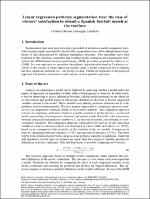Chapter Linear regression pathmox segmentation tree: the case of visitors’ satisfaction to attend a Spanish football match at the stadium
Author(s)
Davino, Cristina
LAMBERTI, GIUSEPPE
Language
EnglishAbstract
Analysis of a dependency model can be furthered by assessing whether a model and/or the impact of regressors on dependent variables differ if heterogeneity is observed. In other words, it may be interesting to assess differences between a global model estimated for a whole group and models estimated for sub-groups identified on the basis of known categorical variables external to the model, as those variables may identify partitions characterized by dependency structure heterogeneity. This is particularly important in decision-making as policies based on the generic model could yield inaccurate and biased results. In this paper, we propose a procedure, the Pathmox approach that exploits the potential of segmentation trees to identify partitions in an initial set of data characterized by different linear regression patterns. We will apply this new approach to measure the visitors’ satisfaction to attend a Spanish football match at the stadium. Thus, we will analyze the relationship between two significant aspects related to the visitors’ satisfaction: stadium service quality and image of the football team, taking into account five visitors’ background variables as potential sources of heterogeneity: age, gender, if they were tourist (yes or not), if it was the first time at the stadium (yes or not), and level of involvement with the football team. From a decision-making perspective, the paper contributes evidence exemplifying how an apparently representative global model can in fact mask different relationships between variables due to heterogeneous data, underlining the importance of accounting for heterogeneity when defining new policies.


 Download
Download Web Shop
Web Shop